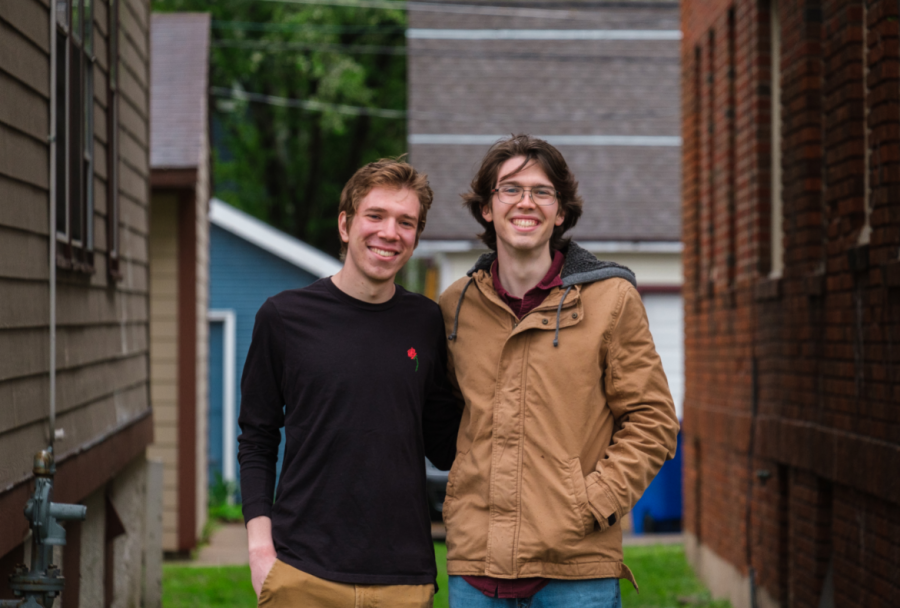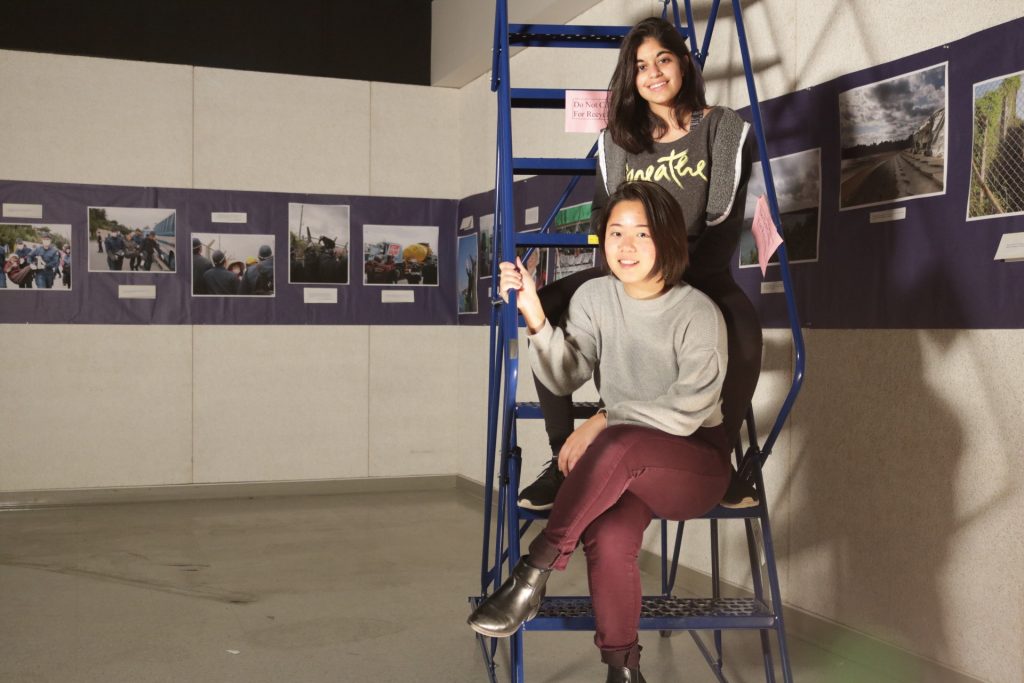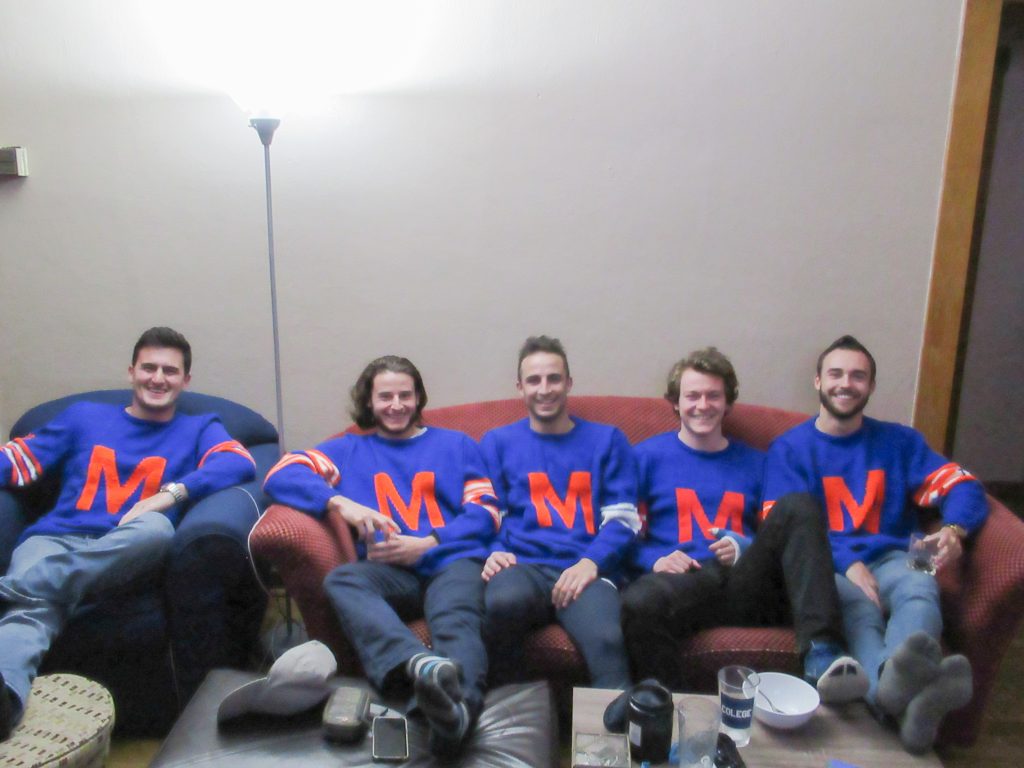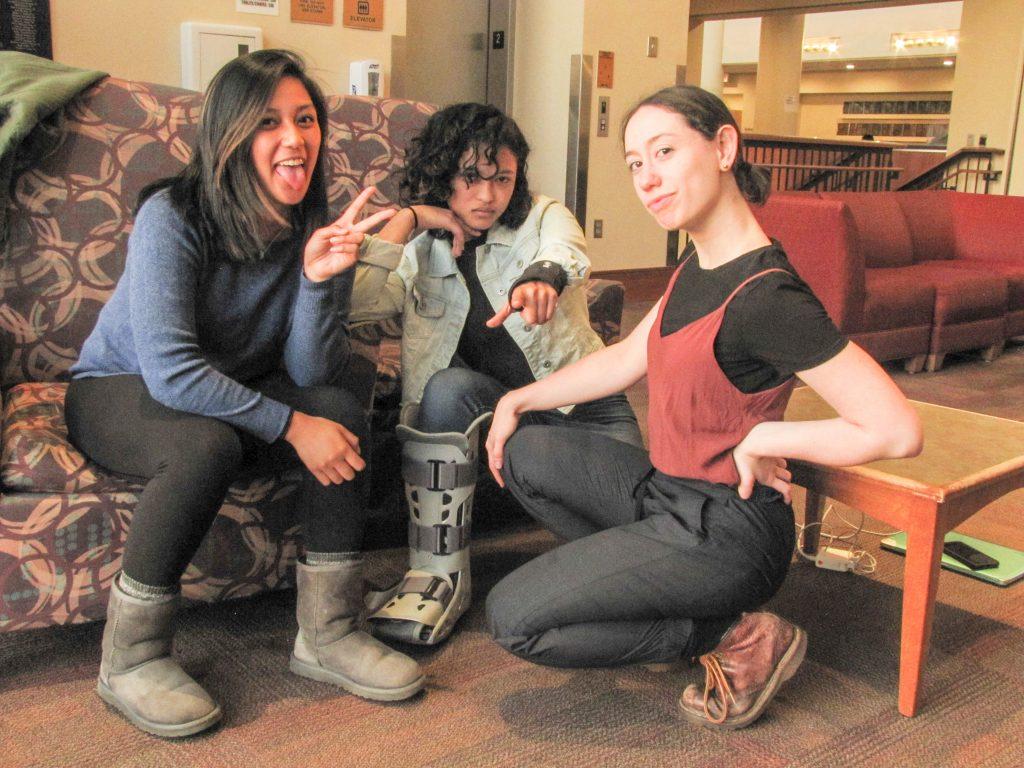
The Mac Weekly sat down with Nick Pyzdrowski ’15, a Psychology major who has worked at Café Mac all four years at Macalester. He volunteers at the Minnesota Internship Charter School, takes classical guitar lessons and likes to philosophize in his free time.
TMW: [Your roommate] was telling me you’re a bit of a philosophizer—you like to philosophize—is that even how you would say it?
NP: You know, that’s a fantastic question. I don’t actually know what the verb form of philosophy would be.
Are there things that you’re particularly interested within philosophy or psychology?
I like to keep an open mind insofar as different domains of philosophy and psychology are concerned. If I had to choose a field or domain of psychology with which I most readily identify, it would probably be humanistic psychology, which definitely has ties with existentialist philosophy. I also like a wide spread of western philosophy and eastern philosophy too. I took a Intro to Buddhism course with Erik Davis last year. So I like to dabble in a lot of different areas.
Is that how you spend a lot of your time in Café Mac—thinking about philosophy?
I mean, when I’m on the job I try to keep my thoughts focused on what it is that I’m doing. It can be problematic when you allow your mind to be somewhere when your body is somewhere else. But I mean, in my free time I like to practice a little bit of guitar, watch some movies if I get the chance, read a book. There are portions of the day where I just will spend some time just ruminating and thinking about the meaning of life, how we can try to increase empathy and improve interrelational dynamics amongst people. I try to reflect upon what lessons we can learn from nature, other creatures. Just thinking about how I might be able to apply my thoughts, ruminations, lessons from my own life and interactions, and hopefully in so doing make the world a better place.
Are you the only senior working [at Café Mac]?
As far as I know, I think there may be one or two other seniors working there. I’m not altogether sure. We, as a group, tend to only work a select amount of shifts throughout the week, usually averaging around three, sometimes four. It’s dependent upon what your financial aid/student employment package would be. I’ve worked with predominantly freshmen, since, you know, freshmen are usually the only ones who either opt to work at Café Mac or, more commonly, have to work at Café Mac. I do think that one or two other seniors have come back this year to work.
Are you kind of the go-to guy for first years’ issues and questions about Café Mac work?
You know, whenever I meet the freshmen workers with whom I’ll be working over the course of the semester, or the year, I always let them know that they can come to me with any work related questions or concerns, or even more broadly with any questions they have about life, or if they want to talk about the meaning of life, I welcome all forms of discourse. But whether or not I’m the go-to guy, I field the occasional question on a shift from some of the freshmen workers, so I definitely do operate in some advice-giving or modeling capacity. A lot of that is just by virtue of my having so many years under my belt that by now I’ve kind of gleaned a lot of the tricks of the trade, so to speak.
For me, it seems that every time I go to Café Mac it just gets more crowded. Would you say that it’s gotten generally more crowded over the years and if so how are you adjusting for that?
I’d say that whether or not your experience of crowd seems to increase or decrease over the years might depend greatly upon what time you happen to go to meals, because there are some times of the day that are just super busy and others that are a little bit of a slower rate of students coming in to dine. But, over the last couple of years, just more generally, I too have realized a kind of bump in the number of individuals that are coming to make use of Café Mac offerings. I’ve talked to some of the full time staff there and one of the factors that they identify for being responsible for that bump is just that we’ve had some successive years in which the classes coming in have been larger than the years before… So when you see the classes, freshman and sophomore, being larger than ours was, then because freshmen and sophomores tend to rely more heavily upon Café Mac, I think definitely that can be a factor that contributes to the increase in bodies that are seeking meals during the day.
Do you think there are any plans to open up another eating space on campus?
Nessie’s—the dining area/recreational area beneath the first floor of the campus centers. That is one of the recent facilities that they’ve made available to students in order to increase food options that they have. The first two years I was here, we had just the main dining facility, we had Scottie’s, the Atrium, oh, and there was sort of a coffee/tea stand that you could access in the fine arts center, but I know that this year, in response to the increasing demand of food by the large numbers of individuals that attend the café, they’ve tried to increase the hours in which certain facilities are open. Whether or not they’re thinking of opening an entirely new cafeteria facility to supplement the one we already have, I don’t know if it’s in the works. I guess it would mostly depend upon whether we continue to see an increase in the number of individuals.
That probably goes for a lot of spaces on campus—not just Café Mac, not just food options but also just general educational things.
Right, and I don’t know if you’ve heard but I heard by way of mouth that they are considering mandating a three-year on-campus living requirement in the future.
Really?
I think they are looking somewhat seriously at making a three year on-campus living policy requirement, mostly as a means to try to facilitate a sense of community. You’d have to ask somebody who would know more about it, but just off the top of my head I can think that if that policy were to become a reality, it might increase the strain upon Café Mac workers if there are more people living on campus.
Do you think there would be a backlash from juniors and seniors with regards to that?
I can imagine that there probably would be just because I think a lot of upperclassmen like to take advantage of the opportunity to live off campus. For one it kind of enables you to get a sense of what it’s like to live independently, on your own, more so than you can get living in a dorm where you have so many resources right at your disposal. Also, I think there’s an attractive element of it wherein if you’re living at an off campus apartment or home that you have the opportunity to live with some of your friends that you may not have had an opportunity to live with previous years just because there’s a shortage of upperclass housing on campus right now. Especially, there’s kind of a limited amount of quads and triples available. Sometimes if you do want to live with four or five friends, then off campus housing can offer you an opportunity to do that while also kind of getting the opportunity to spread your wings a little bit and get a sense of what living independently is like.
We were talking a little earlier about the intersection for you of education and philosophy and psychology. Where do you think that might lead you on down the road?
I eventually hope to be working just very simply in some capacity in which I can be of service to others, whether that entails me being a counselor or a teacher or a social worker. I suppose time will tell just exactly which occupation I end up choosing. For me what’s most important is being able to interact with individuals on a regular basis and use those interactions as an opportunity by which I might be able to pass on some knowledge to others or I might be able to serve as a listening ear to someone. Especially you’ll see with individuals who come from troubled backgrounds or come from houses where the standard of living is somewhat low, or live in a family whose socioeconomic status is low, those broader sociological factors are most of the time largely correlated with issues such as domestic abuse, alcohol abuse, drug abuse, especially so amongst minority populations, and so sometimes what a lot of individuals are seeking, regardless of race, ethnicity, gender or social identity, is just a relationship with someone that is more or less informal and/or not exploitative.
There’s a psychologist—I can’t remember his name of the top of my head—but one of the things he said is that human beings have the capacity to utilize language in ways in which other creatures are not able. One of the problems is that the ways in which we learn to use language usually carry problems that are inherent in the abnormal or unproductive ways in which our parents used language, so as a result of that sometimes the greatest barrier to being an effective communicator, or being a compassionate communicator, is that we just sometimes will get so caught up with our own thoughts about a particular topic or our own thoughts or assumptions about what meaning lies behind what someone else has said, that we sometimes forget that a large part of listening effectively and compassionately entails being able to simply give another individual the time to express how they’re feeling, and to make ever deeper inquiries into why it is they are feeling the way they are, in what ways we can make ourselves useful to them, what ways we can be helpful to them, if they even desire help.
I kind of strayed, I think, more into the realm of philosophizing once again, but that’s really what I would like to do, is just to offer myself in some capacity to be of help or assistance to those who need that sort of relationship in which they can feel safe enough to disclose aspects about themselves that they might not readily share with others. And then within that work, to try to help them develop the independence or the ability to have confidence in themselves and then act upon that confidence in their interactions with others. Whether that means providing moral advice, providing emotional support or just providing factual knowledge. If I can make an impact on somebody else’s life, no matter how small, then I feel as though I’ve spent my time fruitfully, even if I may not get a lot out of that interaction.
I think that if I were to have a tendency to think that I’m not having reciprocal relations with others, it might just be influenced by my definition of what a reciprocal relationship means. Sometimes it’s in the act of giving that we really come to value what the act of taking entails. I think that if I were able to give [back] to individuals, and [see] the noticeable effects it would have upon their behavior or thinking, just to be able to bear witness to that development, is all I would ask for in my work, whatever I have to do.
It’s kind of like this eastern philosophical idea that if you receive a kindness, the idea is not to return the kindness; rather, we would encourage individuals to pass that kindness on—the reason being that helping relationships sometimes will lead to a feeling of debt amongst the individual who’s receiving that help, such that it helps maintain a hierarchical relationship wherein the provider of the help, whether they’re conscious of it or not, becomes the individual who has the greater degree of emotional, social or practical resources and are occupying a position of dominance over the person who’s receiving help, especially if the person who’s receiving help can’t reciprocate it…
What more Buddhist thinkers tend to believe is that if you view a kindness given to you as an opportunity by which you can, then, in turn, help someone else, that can help to solve that sense of debt that you have to a particular individual, or it can help you cognize the debt in such a way that it can be socially and personally beneficial. The short aphorism being: I once knew a man who gave me a kindness and when I asked him, “How might I repay it?” He said, “It’s your kindness, take it and distribute it in 10 acts of kindness to others.” And so with each individual hence, the act of giving becomes an obligation to spread that kindness about. I think if we were to take advantage of that wisdom we could enhance the relationships we have with others, merely by viewing acts of gratitude as opportunities by which we might show thanks for that gratitude, merely by passing it on.
You should consider writing a philosophy column for The Mac Weekly. If all else fails, though, I guess you could start your own band.
Could be, you never know.










Julian Payne • Sep 11, 2019 at 12:18 pm
Thanks for the tips you have shared here. Yet another thing I would like to state is that pc memory demands generally rise along with other breakthroughs in the technologies. For instance, when new generations of processor chips are made in the market, there is certainly usually a matching increase in the size and style calls for of all laptop or computer memory as well as hard drive space. This is because the program operated simply by these processors will inevitably increase in power to make new technological know-how.
Stephen McLean • Sep 10, 2019 at 6:46 am
I’m not that much of a internet reader to be honest but your sites really nice, keep it up! I’ll go ahead and bookmark your website to come back later. Cheers
Charles Metcalfe • Sep 9, 2019 at 5:26 pm
I’ve recently started a web site, and the info you offer on this website has helped me a lot. Thanks for all of your time & work.